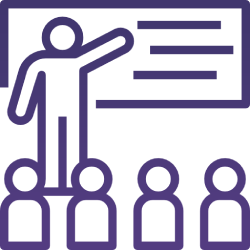Please Note: You can book this course and hold it in credit until you have decided on a specific course date. Alternatively, please view our other course dates
Please Note: You can book this course and hold it in credit until you have decided on a specific course date. Alternatively, please view our other course dates
Our Advanced Python: Best Practices And Design Patterns training course will teach you to become proficient in the following:
Course benefits:
Our Advanced Python: Best Practices And Design Patterns training course covers the following Modules:
Module 1: Object-Oriented Programming in Python
In this module, you will learn how to:
Module 2: Exploring Python Features
In this module, you will learn how to:
Module 3: Verifying Code and Unit Testing
In this module, you will learn how to:
Module 4: Detecting Errors and Debugging Techniques
In this module, you will learn how to:
Module 5: Implementing Python Design Patterns
In this module, you will learn how to:
Module 6: Interfacing with REST Web Services and Clients
In this module, you will learn how to:
Module 7: Measuring and Improving Application Performance
In this module, you will learn how to:
Module 8: Installing and Distributing Modules
In this module, you will learn how to:
Module 9: Concurrent Execution
In this module, you will learn how to:
Our Advanced Python: Best Practices And Design Patterns training course will benefit several individuals and organisations including but not limited to:
Our Advanced Python: Best Practices And Design Patterns training course contains the following:
Our Advanced Python: Best Practices And Design Patterns training course requires attendees to have experience at the level of our Introduction To Python training course.
There is no recommended reading for our Advanced Python: Best Practices And Design Patterns training course.
Advanced Python: Best Practices And Design Patterns Exam:
Attendees may enjoy our three-day Introduction To Python training course as well as our one-day Introduction To Python For Data Analytics training course.
Our three-day Introduction To Python training course will provide a foundation for learning and understanding the Python programming language. Python is a versatile and widely used programming language known for its simplicity, readability, and a large number of libraries and frameworks that make it suitable for various applications. We will teach you how to use Python’s features, standard library modules, and third-party software packages.
Our one-day Introduction To Python For Data Analytics training course will help you gain the skills you need to analyse and visualise data with Python. Aiding in helping you learn the fundamentals of Python programming with a focus on data analytics, and work with popular statistical computing libraries — like numPy, Pandas, sciPy, and Scikit-learn — that allow you to begin analysing data to answer key business questions.
Our Advanced Python: Best Practices And Design Patterns training course offers several benefits to individuals and organisations including but not limited to:
The duration of our Advanced Python: Best Practices And Design Patterns training course is four-days.
INFORMATION

All of our trainers have achieved exceptionally high delegate pass rates for accredited examinations for all our courses. We also offer complimentary pre and post-course support for any questions you may have.

We try and be as flexible as we can and accommodate your needs. We can swap delegates at any time with no charge. We can also create bespoke content should this be required.

We specialise in IT Service and Project Management. All of our Trainers and Consultants have considerable years of hands-on experience in IT Service / Project Management, working across a wide number of industry sectors.

Our training, sales and admin staff are all professional, helpful, friendly and approachable. We believe in providing excellent customer service. You will always have a dedicated friendly Account Manager